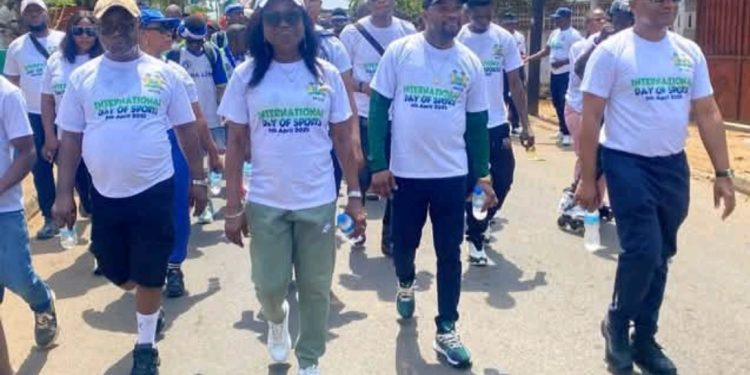By Hassan Osman Kargbo
The Ministry of Sports, in collaboration with the Ministry of Health and Sanitation and a host of development partners, marked the International Day of Sports on April 6, 2025, with a vibrant celebration at the Africell Volleyball Court, Lumley Beach. The event brought together sports participants from across Sierra Leone, highlighting the nation’s commitment to fostering physical activity and promoting health as key components of societal well-being.
The day’s festivities were centered around the theme “Leveling the Playing Field,” which seeks to encourage physical activity for health and well-being.
Dr. George Ameh, the World Health Organization (WHO) Country Representative, delivered a powerful message, underscoring the crucial role of physical activity in preventing non-communicable diseases, which contribute to 75 percent of global deaths.
Dr. Ameh pointed out that alarmingly, 31 percent of adults and 80 percent of adolescents worldwide do not meet the recommended levels of physical activity, a global challenge that has prompted targets to reduce physical inactivity by 10 percent by the end of 2025, with a further 15 percent reduction aimed by 2030.
Dr. Ameh commended Sierra Leone for choosing such a relevant theme, stressing that achieving such ambitious targets would require effective leadership, robust collaborations, and active community engagement.
He reaffirmed WHO’s commitment to supporting Sierra Leone through policy development, guidelines, and partnerships aimed at improving public health through increased physical activity.
The National Sports Authority (NSA) also contributed to the discussions, emphasizing that the International Day of Sports is more than just a competitive event; it is an opportunity to build a culture of health and fitness across various sectors, including workplaces.
A representative from the NSA encouraged sports clubs and athletes to organize friendly matches and fitness challenges that promote camaraderie and foster stronger social bonds.
The positive impact of sports on mental health was also a key topic of discussion, particularly its potential to alleviate stress in today’s fast-paced world. Many participants expressed their gratitude for the inclusivity of the event, pledging to continue working together to improve next year’s celebration and advance health and sports initiatives across the country.
Ismail Kebbie, Programme Manager at the Ministry of Health and Sanitation, highlighted the unifying power of sports in promoting health, inclusion, and overall well-being for people of all ages.
Kebbie noted that the ministry advocates for a life-stage approach to sports, ensuring that everyone—from children to the elderly—has access to physical activity opportunities.
He also emphasized that sports are not just a competitive arena but vital tools for national development, peace, and public health, contributing to physical activity, reduced disease risks, and improved mental well-being.
A special focus was given to including individuals with disabilities in sports, empowering them to lead healthy lives.
Madam Augusta James Teima, Sierra Leone’s Minister of Sports, delivered the keynote address, challenging outdated perceptions that sports are only for the marginalized or those from lower-status occupations. “Sports is a crucial avenue for social change, unity, and health,” Teima asserted, highlighting its role in fostering cooperation through teamwork and skill development. She underscored the importance of this year’s theme—creating a level playing field for all, regardless of gender, background, or ability.
Minister Teima informed the audience that April 6 had been officially recognized by the United Nations as a day to celebrate the positive impacts of sports on human lives.
The day’s activities began with a float parade from Youyi Building to Lumley Beach, signaling Sierra Leone’s commitment to being an active part of the global sports community.
“Sports is not only about competition but about the many benefits it offers in improving physical health, personal growth, and social responsibility,” minister Teima said, and encouraged the youth of Sierra Leone to embrace sports and its myriad benefits, reiterating that sports can play a transformative role in shaping a healthier, more inclusive society.
Teima also used the occasion to advocate for addressing gender inequalities in sports, particularly the disparities in funding between male and female athletes.
She called for a more equitable playing field, one where both men and women receive the support and recognition they deserve.
The minister stressed that sports can unite people across social and political divides, fostering collaboration to tackle issues like poverty, climate change, and health.
The event attracted numerous participants from various sports disciplines, sharing their stories and embraced opportunities for physical activity. Approximately 54 organizations, dedicated to promoting healthier lifestyles through sports, lent their support to the event, underscoring the significance of community engagement in fostering well-being.
Minister Teima concluded the celebration by emphasizing the importance of sports as a tool for youth empowerment, urging young people to use sports as a pathway for personal development, unity, and national peace.
By participating in sports, the youth can contribute to building a stronger, more resilient Sierra Leone, she said.
As the celebrations wrapped up, it was clear that the International Day of Sports had achieved its goal of fostering a sense of community, health, and inclusion, ensuring that Sierra Leone continues to thrive as a nation that values the positive impact of sports on all its citizens.













